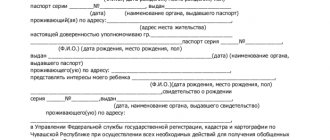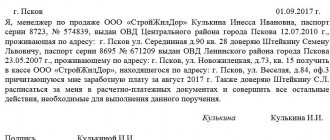All of us are familiar with purchase and sale transactions. Every Citizen of the Russian Federation has the right to sell and buy property. Usually, both the buyer and the seller are personally present during the transaction.
In this article, we will analyze the process of selling an apartment, in which the seller cannot be present at the place of the transaction (perhaps he is not in the city/country or due to health reasons is not able to come in person). In this case, the law provides for a solution in the form of signing powers of attorney for a certain third party.
What is a power of attorney?
A power of attorney is a special document in which you attribute certain powers and their scope to certain third parties. In accordance with Russian legislation, a power of attorney can be certified by a notary or simply registered.
What types of powers of attorney are there?
This document comes in three types:
- One-time
As the name implies, this type of power of attorney gives authority to perform any action only once. For example, such documents can be used to obtain funds one-time.
- Special
In such a power of attorney, the powers of the trustee are strictly prescribed. A person can perform several legal procedures of the same nature within a prescribed period of time. For example, issuing certificates, receiving goods.
- General (general)
In this document, you assign all powers to a third party, and this person has full control over all rights. Such powers of attorney must be signed if any transactions cover a wide legal area and many areas. The authorized person manages the property and can make purchase and sale transactions.
If you sell an apartment, you will need a general power of attorney.
Powers of attorney in forms No. M-2 and M-2a
Using BSP mechanisms to add new filling commands to the forms of various objects. Using configuration extensions for customization.
When you right-click on the print statistics date selection in the context menu, you can “Clear history” and “Print history”.
For example, this applies to cases when a citizen asks a representative to obtain documents from the courts. If the powers of the sole executive body of a wholesale market participant are transferred to a management organization, the specified powers of attorney must be issued by the managed organization (wholesale market participant) represented by the sole executive body of the management organization and under the seal of the managed organization.
How to obtain a power of attorney?
Photo Pexels
A general power of attorney is a document that has great notarial and legal force. To obtain such a power of attorney, you need to go to a notary’s office, where a notary will draw up this document especially for you.
To transfer all rights to a trusted person, the agent of the notary office will need:
- Full details of the principal (that is, yours). These are documents such as passport details.
- Certificate of ownership of property (in this case, an apartment).
- A document confirming the transfer of property to you (deed of gift, purchase and sale agreement, certificate of inheritance).
- Certificate of absence of debts for utility services.
- Apartment address
- If you are married, a written agreement from your partner.
- You will definitely need the passport (or a copy thereof) of the authorized person.
- If the home is owned by a person under 18 years of age, the person can sign a power of attorney only after the written consent of the guardian.
Registration of a power of attorney
To issue a power of attorney, you do not need to look for any sample documents yourself. A power of attorney is a document that has no legal force unless certified by a notary. In other words, you cannot write a power of attorney by hand; you must contact a specialist.
The notary reviews all documents and verifies your identity. Afterwards, following a special template, he fills out all the necessary papers, taking into account the number of delegated powers and the specifics of the transaction. Afterwards, if the terms of the contract suit you, you sign this document. After signing the document, the notary enters it into the register.
If the property has multiple owners, all owners must sign a power of attorney. If the owner is divorced, the former spouse must sign the agreement to complete the transaction. This is done because an apartment purchased during marriage is considered joint property and the ex-spouse has the right to housing.
If the owner is incapacitated at the time of execution of the power of attorney, the document is signed by the guardian (in fact, protecting the interests of the incapacitated person is his direct responsibility).
The register is a single resource where the facts of the use of invalid documents are checked.
The participation of a third (trusted) person in the registration process is optional.
Following the legislation of the Russian Federation, powers of attorney do not have a specific validity period. You can choose the period of validity of the documents yourself. Often a general power of attorney is issued to conduct purchase and sale transactions, so you can indicate that the document will become invalid immediately after the end of the process. But if you did not write the validity period, then the power of attorney will remain valid for a year.
But under certain conditions, the power of attorney may expire earlier. For example, if you change your mind about selling your home or one of the parties is declared incompetent by the court.
Features of drawing up a power of attorney, general information
To date, there is no single unified form of power of attorney for issuing powers of attorney. This means that representatives of enterprises and organizations have the opportunity to write it in free form or according to a template developed within the company, if one is available.
Regardless of which option is chosen, when drawing up a power of attorney, it is important to take into account several common points that are common to all such papers. In particular, you need to ensure that the structure and content of the form comply with certain standard office practices.
The power of attorney must be divided into three parts:
- "hat"
- main block,
- conclusion.
The main block must include information about the principal and the authorized person (including passport data), information about which powers of attorney and for what period the principal’s representative has the right to issue, as well as for what period the initial power of attorney was issued.
It is important to take into account one important nuance: the main proxy cannot issue powers of attorney for a period exceeding the validity period of the main document.
The power of attorney can be written by hand or typed on a computer - this parameter does not play a role in determining its legality, as well as whether it is drawn up on the company’s letterhead or on a simple blank sheet of paper of any suitable format (preferably A4).
It is important to write a power of attorney without errors, and if any do occur, it is better to draw up a new form.
A power of attorney for the issuance of powers of attorney must be signed by three parties: the principal, who certifies with his signature the signature of his authorized representative, the authorized person, and also an employee of the notary office.
At the same time, if a power of attorney is issued by the head of an organization, it is not necessary to put a seal on the form today (according to the law, legal entities have the right not to use stamps in their work), but on the part of a notary, the seal must be affixed.
The power of attorney is written in one copy . After the document has been drawn up and endorsed, information about it should be entered into the internal documentation journal, which is usually kept by the secretary of the organization.
How to revoke a power of attorney?
Photo by Pexels
The principal must contact the notary who drew up the power of attorney with a statement. If you need to revoke a power of attorney urgently, and it is not possible to meet with a notary, you are allowed to use the services of another specialist. The application must indicate the intention to cancel this document. The notary must announce to all participants in the transaction who signed the power of attorney about the owner’s intentions. Also, the notary must note in a special register (see above) the cancellation of the power of attorney, so that in the event of a subsequent sale of the property, the owner will not have any problems.
You can also inform about the cancellation of a document yourself orally or in writing.
Cost of power of attorney
Everything here is quite individual and depends on the specific region, but on average, prices for this type of power of attorney (general) start from 2,000 rubles and above.
The cost of a power of attorney consists of:
- state fees for the service.
Depends on the relationship between the owner and the trustee. If a relative (son, father, nephew) becomes the third party, the cost of the fee is 100 rubles. If a friend, colleague (or other acquaintances) becomes the third party, the cost will be increased to 500 rubles.
- fees for performing technical and legal services.
It is also worth remembering that the more powers you give to a third party, the more expensive the power of attorney will be.
Rules for issuing a power of attorney by hand
The legislation of the Russian Federation does not contain precise rules for writing a power of attorney for anything. It is also not necessary that the document be written in printed form; writing can be done by hand, but the entire text of the document must be written in beautiful handwriting, legible and without grammatical or spelling errors.
Errors in writing a power of attorney by hand are:
- Incorrectly written name, or the name of the organization, the principal and the authorized person (such gross errors cannot be contained in the document);
- Failure to write the date (without a date, the power of attorney is considered void);
- Lack of the principal's autograph.
To write a document of this type by hand, you will need to provide the information below:
- Information about the principal and representative (information must be presented in such a way that the person accepting such a document could make out who is who);
- An accurate and specific (preferably point by point) list of rights and functions that a representative acting on someone’s behalf can perform;
- Day, month and year of document generation.
- Company seal (in cases where the document is issued on behalf of a legal entity).
( Video : “Executing a power of attorney”)
Who can be an authorized person
Depending on the specific power of attorney, essentially any person can be an authorized person.
Of course, it is desirable that this person be familiar to the trustor, since the transfer of rights and obligations to something, especially if this something is valued at many thousands or millions in monetary terms, should not be trusted to the first person you come across. An authorized person can act as an ordinary person, a relative, a work colleague, a special company, or an individual entrepreneur.
Important! A representative can only be a citizen of the Russian Federation, with documentation confirming this. That is, a person living on the territory of Russia who has a passport.
For example, for a power of attorney to receive money from a bank, the best option would be either a special service for this or a relative, but a power of attorney to sell an apartment would be cost-effective to issue to a trusted realtor.
To guess correctly with a representative, you need to focus on two factors:
- Trust in a person or company;
- Sufficient level of competence in the assigned task.
What are the types
Since powers of attorney are issued for completely different reasons, and with completely different functions, they have types, which differ from each other.
Types of powers of attorney:
- General;
- General
With the help of these types of power of attorney, the representative has the right to exercise a wide range of powers (which is not limited and is determined by the principal).
For example:
- Be in front of a large number of individuals, both physical and legal;
- The ability to manage and diversify the principal’s property;
- Control the assigned task from the beginning to the end of its solution.
Let's say an individual goes to another country to earn money for a period of 5 months (from 01/01/2021 to 01/06/2021). During this period, his assets, such as a car, an apartment, will just sit and gather dust. In this regard, the person decides to draw up a power of attorney to represent interests in leasing an apartment, as well as for leasing a car to a driving school. Both assets are rented out for 5 months at the request of the main party. This means you need to draw up a power of attorney, in two copies (one for the car, the second for the apartment), and hand it over to an authorized person, namely a realtor and a legal organization (driving school). In this case, it specifically describes what certain individuals must do from which to which date, and what amounts must appear in the monetary turnover associated with this document.
( Video : “Everything about drawing up a power of attorney”)
To whom are powers of attorney issued?
You can issue a power of attorney to anyone. This could be your partner, relative, friend or colleague.
When signing a power of attorney, you must be completely confident in the honesty of your representative, since you are transferring a lot of rights to him. It is better to make relatives and close friends your confidante, that is, people you have known for a very long time.
It is worth considering that by giving a person, by proxy, the right to enter into all kinds of transactions with property on his own behalf and subsequently register the transfer of ownership, the principal, in fact, can no longer strictly control how the proxy will manage his real estate (sell it or even give it away for nothing) ), what amount he will value and what he will purchase from the buyer.









